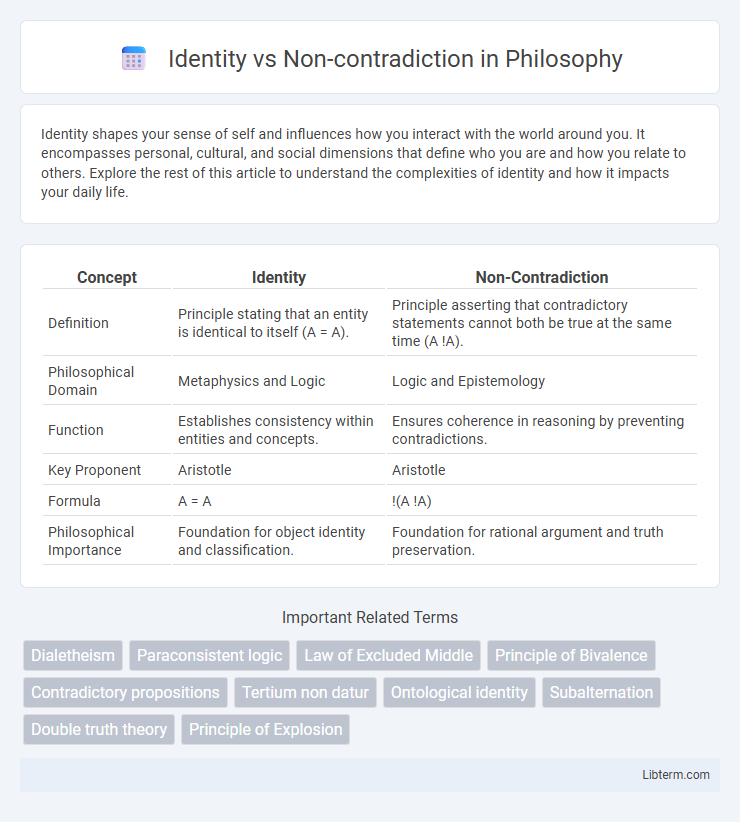Identity shapes your sense of self and influences how you interact with the world around you. It encompasses personal, cultural, and social dimensions that define who you are and how you relate to others. Explore the rest of this article to understand the complexities of identity and how it impacts your daily life.
Table of Comparison
| Concept | Identity | Non-Contradiction |
|---|---|---|
| Definition | Principle stating that an entity is identical to itself (A = A). | Principle asserting that contradictory statements cannot both be true at the same time (A !A). |
| Philosophical Domain | Metaphysics and Logic | Logic and Epistemology |
| Function | Establishes consistency within entities and concepts. | Ensures coherence in reasoning by preventing contradictions. |
| Key Proponent | Aristotle | Aristotle |
| Formula | A = A | !(A !A) |
| Philosophical Importance | Foundation for object identity and classification. | Foundation for rational argument and truth preservation. |
Defining the Principle of Identity
The Principle of Identity states that each entity is identical to itself and possesses a specific set of attributes that define its existence, ensuring consistency in logic and reasoning. This foundational principle asserts that an object cannot be something other than what it is at the same time and in the same respect, establishing clear boundaries of identity. Defining identity enables precise differentiation between objects or concepts, facilitating coherent communication and analytical clarity.
Understanding the Law of Non-Contradiction
The Law of Non-Contradiction, a fundamental principle in classical logic, asserts that contradictory statements cannot both be true in the same sense at the same time, ensuring consistency in reasoning. Understanding this law involves recognizing that a proposition and its negation cannot coexist, forming the basis for coherent argumentation and truth evaluation. This principle underpins rational discourse by preventing logical paradoxes and enabling clear differentiation between identity and contradiction.
Historical Origins of Identity and Non-Contradiction
The principles of identity and non-contradiction trace back to ancient Greek philosophy, primarily articulated by Aristotle in his works such as "Metaphysics." Identity states that an object is the same as itself (A is A), while non-contradiction asserts that contradictory statements cannot both be true simultaneously (A cannot be both B and not B at the same time in the same respect). These foundational laws underpin classical logic and metaphysics, shaping Western philosophical and scientific thought from antiquity to modern logic systems.
Key Figures in the Development of Logical Laws
Aristotle is a central figure in the development of the laws of logic, particularly the law of identity and the law of non-contradiction, which he articulated as foundational principles of classical logic. His work in "Metaphysics" formalized these laws, asserting that an entity is identical to itself (A is A) and that contradictory statements cannot both be true simultaneously (not both A and not A). Later logicians such as Gottfried Wilhelm Leibniz expanded on these concepts, integrating them into symbolic logic and influencing the evolution of formal systems that underpin modern computational logic.
Formal Expressions in Classical Logic
Identity in classical logic is expressed through the equality symbol "=", establishing that an entity is self-identical within formal systems. The law of non-contradiction is represented by the impossibility of simultaneously asserting a proposition "P" and its negation "!P" in any interpretation. Formal expressions such as x (x = x) for identity and !(P !P) for non-contradiction serve as foundational axioms reinforcing consistent reasoning in predicate logic.
Identity vs Non-Contradiction: Core Differences
Identity asserts that each entity is identical to itself, ensuring consistency in definitions and properties. Non-contradiction prohibits an entity from possessing mutually exclusive attributes simultaneously, maintaining logical coherence. Both principles underpin classical logic but differ as identity emphasizes self-sameness, while non-contradiction focuses on preventing contradictory states within an entity.
Interdependencies Between the Two Principles
Identity and Non-contradiction are foundational principles in classical logic that operate interdependently to ensure coherent reasoning. The principle of identity asserts that an entity is identical to itself (A is A), while non-contradiction maintains that contradictory statements cannot both be true simultaneously (not A and not A). Their interdependency lies in establishing stable truth values, where identity defines the consistent nature of entities and non-contradiction prevents logical conflicts, collectively enabling clear differentiation of concepts and valid inference.
Practical Implications in Reasoning and Argumentation
The principle of Identity ensures that each concept or proposition remains consistent, forming the foundation for clear reasoning and reliable argumentation. Non-contradiction prevents conflicting statements from coexisting, thereby safeguarding the coherence of arguments and enabling effective decision-making. Together, these principles enhance critical thinking by promoting clarity, consistency, and logical integrity in discourse.
Challenges and Critiques from Modern Philosophers
Modern philosophers critique the principle of identity and non-contradiction for its limitations in capturing the fluidity of identity over time and the complexity of paradoxes in language and thought. Challenges arise from quantum mechanics and fuzzy logic, which demonstrate situations where strict binary classifications fail. These critiques urge a reevaluation of classical logic frameworks, emphasizing context-dependent and dynamic interpretations of identity.
The Relevance of Logical Laws in Contemporary Debates
Logical laws such as Identity and Non-contradiction remain fundamental in contemporary debates across philosophy, science, and law, providing clear criteria for consistency and coherence in arguments. The Law of Identity asserts that an entity is identical to itself, establishing a baseline for defining concepts and ensuring semantic clarity. The Law of Non-contradiction prevents contradictory statements from both being true simultaneously, which is crucial for resolving conflicts and maintaining rational discourse in complex discussions.
Identity Infographic

 libterm.com
libterm.com